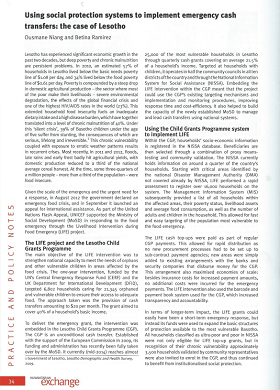Using social protection systems to implement emergency cash transfers: the case of Lesotho
Lesotho has experienced significant economic growth in the past two decades, but deep poverty and chronic malnutrition are persistent problems. Given the scale of the emergency and the urgent need for a response, in August 2012 the government declared an emergency food crisis, and in September it launched an appeal for international assistance. As part of the United Nations Flash Appeal, UNICEF supported the Ministry of Social Development (MoSD) in responding to the food emergency through the Livelihood Intervention during Food Emergency (LIFE) project.
The main objective of the LIFE intervention was to strengthen national capacity to meet the needs of orphans and other vulnerable children in areas affected by the food crisis. The one-year intervention, funded by the UN’s Central Emergency Response Fund (CERF) and the UK Department for International Development (DFID), targeted 6,802 households caring for 21,345 orphaned and vulnerable children to ensure their access to adequate food. The approach taken was the provision of cash transfers amounting to $20 per month. The grant aimed to cover 40% of a household’s basic income.
To find out more, download the article in full.



